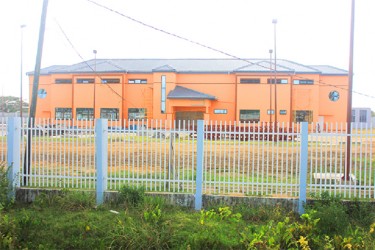The long-awaited Forensic Lab is about to be completed, but DNA testing is still not on the front burner.
According to Home Affairs Minister Clement Rohee, as the final touches are being made to the interior of the building, the Office of the President has given a directive to put DNA testing facilities in place.
“We have been asked by the Office of the President to work towards building capacity in the lab to facilitate DNA testing… What we have decided to do is to complete what we have set out to do in accordance with the plan for the completion of the lab because we don’t want to delay further the commissioning of the laboratory…,” he said.

Responding to questions during a press conference last week, he stressed that “on completion of this, with the staff in place we will then move to the next stage which is to look at ways and means of incorporating in the functioning of the lab, DNA testing.”
Rohee said the lab, which is located on the University of Guyana’s Turkeyen Campus, is nearing completion. He explained that the physical work of the building is virtually completed. “What is being done now is the installation of equipment, installation of shells and other pieces of hardware that have arrived in the country.
Equipment that had to be calibrated and could not be calibrated, six months before because calibration of equipment that goes into the forensic lab has to be done almost instantaneously. So the equipment is being installed by a team from Barbados,” he said.
According to Rohee, the security features of the lab are also being installed. He said they have been given the assurance that the highly technical jobs would be completed by the third week in October.
In the meantime, all the human resources have been hired and they will soon sign their contracts, thus making them legally attached to the Forensic Laboratory.
In June 2011 when the foundation for the $450 million state-of-the-art forensic laboratory was being built, government had given the expected completion date as May 2012.
Behind time
For Alliance for Change (AFC) Chairman Nigel Hughes, DNA testing should have been taken into consideration from the beginning as Guyana is already behind time in this regard. He said this is something that should have been implemented a long time ago. “It should have been a priority,” he stressed.
According to Hughes, DNA testing becomes even more important when there are repeated instances where eyewitnesses fear coming forward. “Witnesses are terrified and we should move in that direction. We cannot depend on eyewitnesses anymore,” he said.
DNA testing has proved to be a critical component of police investigations all around the world. With Guyana’s crime rate and backlog of unsolved cases, it becomes even more important to have facilities in place to have this sort of testing done. Crime Chief Seelall Persaud had told this newspaper that the police force’s lab can only prove the existence of human blood. “We can’t go beyond the blood group,” he explained.
As a result, samples are sent abroad for testing. Caribbean labs have been the first choices in the past but because of the length of time it takes to get the results, the force has looked in the direction of the United States. However, to send it there is very costly and Brazil might be another option.
Samples from the Lindo Creek massacre and the Sheema Mangar case are prime examples where Guyana turned to Caribbean labs and were left disappointed when it took years before the results were returned.
Hughes said the first thing government should have thought about when building the lab was how quickly it could be made operational. He pointed out that too much time has passed and the facility is still not functioning. He said too the government’s primary concern at time of construction should have been implementing measures that could effectively solve crime.
Meanwhile, former police commissioner and APNU parliamentarian Winston Felix said it all has to do with building capacity as the persons hired to work at the lab would lack experience.
“I know that DNA has been on the cards and I also know that you have to develop some capacity because I gather that they are all inexperienced people being taken to the lab and just being trained and so you have to give them time to develop… to see their competence in testing, in examining under the microscope samples which are sent to them and having developed to a certain extent they can now go to the much more testier area in terms of dealing with DNA,” he said.
Felix, the APNU’s shadow Home Affairs Minister, said one must understand that government usually starts off things the wrong way. “If you are to take Amaila as an example and Skeldon you would see that this government doesn’t do anything right. It starts off with doing things the wrong way, spending a lot of money and then having to spend money to correct the faults eventually,” he said.
While noting that he knows little about the planning that went into the construction of the lab he said it seemed to him that that it took “an extremely long time to construct the lab which is just a basic building and to put in the facilities to enable work to be done in it.”
Asked whether government should have consulted with the opposition on the project, he said, “not necessarily, the opposition but there are a lot of technical people out there with experience whose availability could have been capitalized on to get advice on design and so on because this is a lab, it is not an ordinary house…”




